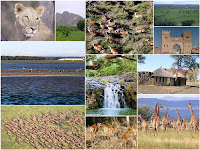The Masai: The Greatest Warriors Of Africa
 To me, the Greatest warriors in Africa are the Masais. It's said that: 'respect is won and not/never demanded'. As a tribe, as a people - of all the African tribes, the Masais have won my uttermost admiration and respect.
To me, the Greatest warriors in Africa are the Masais. It's said that: 'respect is won and not/never demanded'. As a tribe, as a people - of all the African tribes, the Masais have won my uttermost admiration and respect.To many, they may seem backwards. To many, they may seem as a people who have 'clinged' to the past and hence 'remained' behind. To many, they may seem too arrogant and proud. But that is what makes the Masais distinct and unique. Distinct and unique in a very positive way. That's what has won the Masais; respect, admiration and attention, worldwide.
My personal experience with Masais, is what has made me respect and admire them as highly as I do. Wherever I find or see them, they always have this distinct, dignified, composure; always detached and full of pride - at times, arrogant and stubborn. The more traditional and conservative the Masai is, the more so. The few Masais I have had the honor and luck of befriending - have been friends indeed. And the few Masais, I have worked with, have always been people who keep their word and are always honorable in what they do and say; and very reliable and trustworthy.
Come to think of it, I personally have never met a Masai begging or involved in some demoralizing activity. Truck driver relatives and friends of mine, many of whom drive trucks across the whole of East Africa - say, very rarely have they come across or seen a Masai prostitute. To Masais, a people who value 'honor' highly, women have to reflect the Masai honor and dignity even more so.
Due to the Masais distinct and unique nature, governments, past and present, in both Kenya and Tanzania - where Masais live - have always had to govern and relate to the Masais in a more different, special way. Ever since white men came to eastern Africa, they have been having unhappy kind of love affair with the Masai people. Unhappy, because admiration and exasperation have been almost equally blended in the feelings towards these handsome, arrogant and stubborn tribesmen. Almost, if not quite, alone among the tribes of eastern Africa, the Masai have turned their backs upon the prizes and temptations off by the West. Whatever one might think of the Masais, like them, hate them or detest them, one thing is certain: the Masais always win respect, admiration and attention. And have been and are the focus of numerous books and films. More than any other sub-Sahara African tribe. And probably, more than any other tribe or people in Africa.
Photo from: friendlyplanet.com


